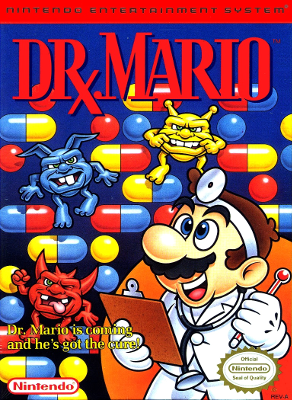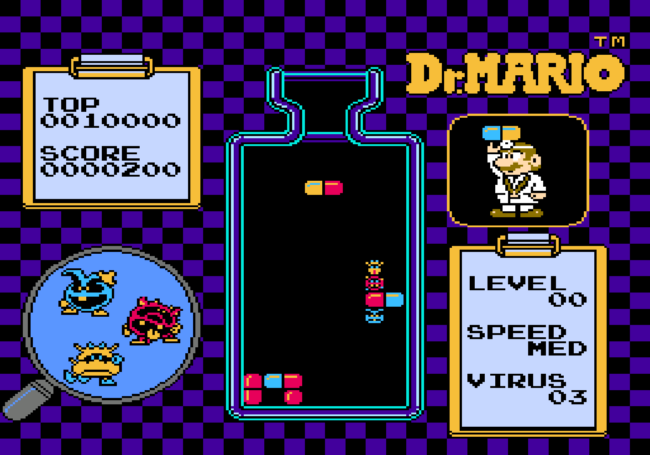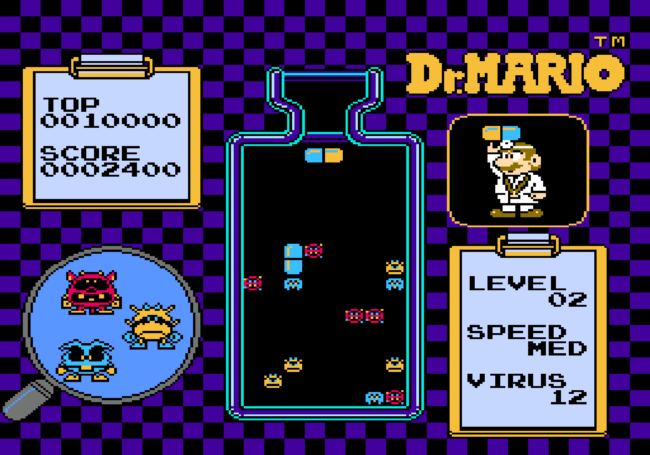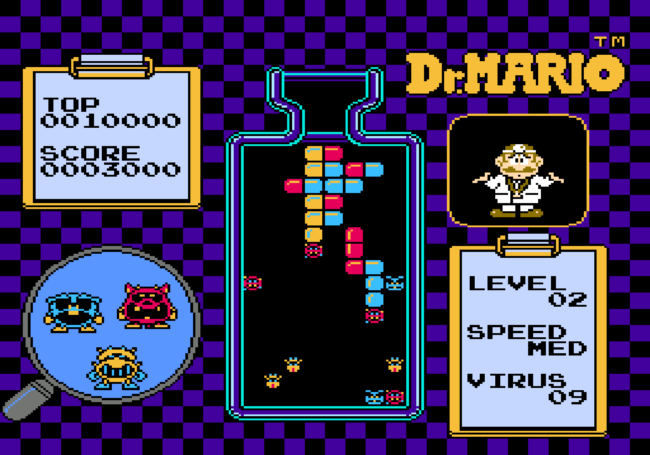Dr. Mario Review (Nintendo, 1990)

Have you ever had a commercial’s jingle get stuck in your head? I’m sure we all have at one point. I randomly find myself reciting the commercial jingle for Dr Mario, and I haven’t actually heard it in over thirty years, that is until today when I looked it up. Back at the time of release Tetris was absolutely huge. Every console needed an appropriate clone or else it was doomed to failure. Nintendo decided to cash in on this phenomenon (instead of leaving it to third parties) and suddenly Mario became a doctor. He has had a lot of jobs over the years so it’s not that surprising. Nintendo also isn’t shy when it comes to throwing their biggest names behind original titles. Really, Dr Mario was not as crazy a concept as it sounded. Today we’re going to take a look at it. Let’s jump in.
Dr. Mario plays in a very similar fashion to Tetris. You view the play field from the side as blocks drop down from the top and you control them by moving either left or right. The twist comes in the ‘doctor’ format. The playfield is represented as a bottle. The pieces are all pills with two different segements. You change their alignment with the A button. They can be, and often are differently colored. Your goal isn’t simply to get the high score playing endlessly. Instead you have to eliminate viruses. These are colored in the same fashion as the pills you’re controlling. Your goal is to destroy all of these at which point you move on to the next stage. These viruses are placed throughout the play area, and their numbers increase with each higher level. In typical fashion you lose when the pills reach the top.

This means the strategy is completely different than in Tetris. You can of course line up pills on the bottom of the play area to eliminate for points, but that actually works against time completion. Segments break off when they’re no longer attached. This allows for combination eliminations. Dr Mario doesn’t play by any other puzzle game’s rules and that’s why I love it. The fact that the viruses can appear at any height within the bottle can completely change your strategy. This also means that you’re in danger of losing much faster than you would otherwise be in Tetris. To make matters worse the pills fall faster in the later areas. Sometimes you’ll have mere fractions of a second to figure out where things need to go. A good puzzle game needs to have enough nuances to set itself apart from Tetris, and in this respect Dr Mario succeeds.
Dr Mario is also one of the few puzzle titles where I felt like I could actually play around with the mechanics to get a higher score. Your goal is to line up colored pill segments with the viruses, but you still get points if you focus on your own pills. This means you can line up pills along the bottom of the stage to gain extra points. You can get some serious high scores by doing this. You’ll also find situations where you’ve been forced to cover the viruses with differently colored pill segments. It’s fun to figure out ways to eliminate these because you can also do so horizontally. In my opinion there’s more strategy in Dr Mario than Tetris, and because of this it’s more fun to play. The simple nature of the game with unique mechanics helps Dr Mario to stand apart from the pack.

I also really like the plethora of play modes available here. From the start you can choose between one and two players. What’s also nice is the fact that you can choose which virus stage to start at as well as the speed of play. Really there are few puzzle games that have as many options as Dr Mario does. What’s nice is the fact that you can even choose the background music to listen to while you play. As far as I know there aren’t any other puzzle games that allow you to basically pick up from where you left off. I found that choosing the highest level and the fastest speed made me significantly better at puzzle games in general. Those new to the genre can accustom themselves to the play mechanics however. This one is extremely accessible
Graphically Dr Mario is about what you would expect. The backgrounds are all simple black, but the colors are all easy to make out from one another (extra points for making this one easy to see for colorblind folk). I do however like the sprite depicted for Mario. Nintendo was able to put him into a new costume while making him still recognizable. Also, the animations on the viruses (as depicted in the bottom left hand of the screen) are neat and downright iconic now. Everything else moves at basically a slideshow, but that’s intentional. The music however is amazing. I really love the fact that you can choose which tracks plays while you play. Chill in particular has become downright iconic at this point. Sure, it’s all bleeps and blips but I’ll be darned if these tunes didn’t get stuck in my head. The music overall is great.

Dr Mario has long played second fiddle to Tetris. In my opinion it’s actually better than that. You can find few other puzzle games from this era with the same number of options as in here. Dr Mario is also extremely polished, and the strategies here differ a lot from your typical puzzler. Nintendo has always had a way of pushing the boundaries and making each genre their own. They absolutely did that in this case. If you’re looking for a classic puzzle game that’s not quite like the sea of Tetris clones then this is a safe bet. In case you’re wondering, the lyric stuck in my head is ‘and then he shrunk my head.’ I’ll probably never be able to shake it, but that’s okay because I don’t mind being reminded of this gem.
The post Dr. Mario Review (Nintendo, 1990) appeared first on Infinity Retro.
* This article was originally published here
Comments